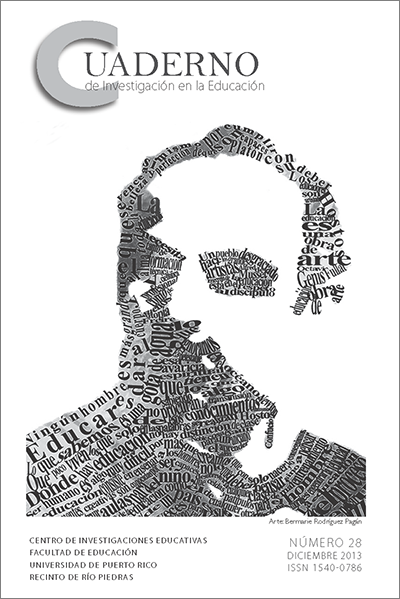Résumé
Ciencia Puerto Rico (CienciaPR) es una organización sin fines de lucro interesada en promover las ciencias y la educación científica en el archipiélago borinqueño. Uno de sus logros más recientes fue la publicación del libro ¡Ciencia Boricua!: Ensayos y anécdotas del científico puertorro, una colección de 61 ensayos cortos escritos por investigadores locales, que presentan contenido científico de una manera sencilla, contextual y culturalmente relevante. El propósito de este artículo es presentar los hallazgos de un proyecto piloto implementado en la Nueva Escuela Juan Ponce de León, en Guaynabo, Puerto Rico, durante el año 2012. Luego de integrar una serie de actividades educativas basadas en ¡Ciencia Boricua! que complementarían el currículo escolar tradicional, se entrevistaron a los cuatro maestros que colaboraron con CienciaPR. Se identificaron áreas donde la implementación fue exitosa e importantes sugerencias para replicar el proceso a mayor escala en el futuro.
Cómo citar:
González-Espada, W., Fortis-Santiago, Y., Guerrero-Medina, G., Ortiz Vega, N. M., Colón-Ramos, D., & Feliú-Mójer, M. (2013). Suplementando el currículo de ciencias con contenido contextual y culturalmente relevante: Lecciones de la implementación del Proyecto Ciencia Boricua. Cuaderno de Investigación en la Educación, 28, 109-127. Recuperado a partir de https://revistas.upr.edu/index.php/educacion/article/view/13575
Références
Apple, M. (1986). Teachers and texts: A political economy of class and gender relations in education. New York, NY: Routledge & Kegan Paul.
Banks, J. A. (1994). An introduction to multicultural education: Theory and practice. Boston, MA: Allyn and Bacon.
Banks, J. A., & McGee Banks, C. A. (1995). Handbook of research on multicultural education. New York, NY: Macmillan Publishers.
Bell, R. L., Matkins, J. J., & Gansneder, B. M. (2011). Impacts of contextual and explicit instruction on preservice elementary teachers‘ understandings of the nature of science. Journal of Research in Science Teaching, 48(4), 414-436.
Ciencia Puerto Rico. (2013). Proyecto Ciencia Boricua. Recuperado de http://www.cienciapr.org/en/proyecto-ciencia-boricua
Crawford, B. A. (2000). Embracing the essence of inquiry: New roles for science teachers. Journal of Research in Science Teaching, 37(9), 916-937.
Departamento de Educación (2013). Perfil del Departamento de Educación de Puerto Rico, año académico 2009-2010, version 2.0. Recuperado de http://www.de.gobierno.pr/sites/de.gobierno.pr/files/ PR_State_Report_Card_2009-2010.pdf
Gay, G. (1995). Bridging multicultural theory and practice. Multicultural Education, 3(1), 4-9.
González Espada, W. (2001). High school physics teaching in Puerto Rico: A quantitative and qualitative analysis of context and cultural relevance. Unpublished doctoral dissertation, The University of Georgia, Athens.
González Espada, W. J., Colón Ramos, D. & Feliú Mójer, M. I. (Eds.). (2011). ¡Ciencia Boricua!: Ensayos y anécdotas del científico puertorro. San Juan, PR: Editorial Callejón.
Hobson, A. (2000). Teaching relevant science for scientific literacy. Recuperado de http://physics.uark.edu/Hobson/pubs/00.12.JCST.pdf
Johnson, C. C. (2011). The road to culturally relevant science: Exploring how teachers navigate change in pedagogy. Journal of Research in Science Teaching, 48(2), 170-198.
Ladson-Billings, G. (1995a). But that‘s just good teaching! The case for culturally relevant pedagogy. Theory into Practice, 34(3), 159-165.
Ladson-Billings, G. (1995b). Toward a theory of culturally relevant pedagogy. American Educational Research Journal, 32(3), 465-491.
Lave, J. & Wenger, E., (1991). Situated learning: Legitimate peripheral participation. Cambridge: Cambridge University Press.
Laughter, J. C. & Adams, A. D. (2012). Culturally relevant science teaching in middle school. Urban Education, 47(6), 1106-1134.
Menchaca, V. D. (2001). Providing a culturally relevant curriculum for Hispanic children. Multicultural Education, 8(3), 18-20.
Meyer, X. & Crawford, B. A. (2011). Teaching science as a cultural way of knowing: Merging authentic inquiry, nature of science, and multicultural strategies. Cultural Studies of Science Education, 6(3), 525-547.
Milner IV, H. R. (2011). Culturally relevant pedagogy in a diverse urban classroom. Urban Review, 43(1), 66-89.
Nieto, S. (1992). Affirming diversity: the sociopolitical context of multicultural education. New York, NY: Longman.
Osborne, A. B. (1996). Practice into theory into practice: Culturally relevant pedagogy for students we have marginalized and normalized. Anthropology & Education Quarterly, 27(3), 285-314.
Patchen, T. & Cox-Petersen, A. (2008). Constructing cultural relevance in science: A case study of two elementary teachers. Science Education, 92(6), 994-1014.
Sampson, D. & Garrison-Wade, D. F. (2011). Cultural vibrancy: Exploring the preferences of African-American children toward culturally relevant and non-culturally relevant lessons. Urban Review, 43(2), 279-309.
Smith, N. (1988). In support of an applications-first chemistry course: Some reflections on the Salter‘s GCSE scheme. School Science Review, 70(250), 108-114.
Vygotsky, L. (1962). Thought and language (E. Hanfmann & G. Vakar, Eds.). Cambridge, MA: MIT Press.
Vygotsky, L. (1978). Mind in society: The development of higher psychological processes (M. Cole, V. John-Steiner, S. Scribner & E. Souberman, Eds.). Cambridge, MA: Harvard University Press.

Ce travail est disponible sous licence Creative Commons Attribution - Pas d’Utilisation Commerciale 4.0 International.
© Cuaderno de Investigación en la Educación 2013

